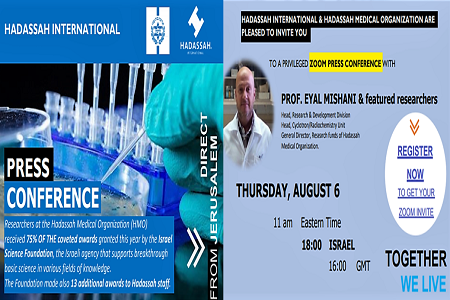
At an August 6 press conference hosted by Hadassah International, four of the 19 Hadassah Medical Organization physician-scientists who received research grants this year from the Israel Science Foundation (ISF) presented their latest work. “When you combine teaching, research, and clinical activity, you reach excellence,” commented Prof. Eyal Mishani, director of Hadassah’s Division of Research and Development.
The first physician-scientist to discuss his work was Prof. Abd Al-Roof Higazi, head of Hadassah’s Department of Clinical Biochemistry and Division of Laboratories. When it became clear that COVID-19 was associated with increased blood clot formation, he explained, he knew he had a role to play in fighting the disease. Several years ago, he and his colleagues discovered that a family of proteins called alpha-Defensins, found in white blood cells, is linked to inflammation and increased clot formation. Patients with COVID-19 have an increased amount of this protein and, therefore, life-endangering inflammation. “If we can prevent this protein from increasing, we can prevent blood clots,” he said.
Giving COVID-19 patients a drug called colchicine, an oral medication for gout, and Familial Mediterranean Fever led to a “nice improvement” for some patients, Prof. Higazi reported. Other medical institutions around the world, he said, have also used this medicine successfully. “If we can do this on a large scale, perhaps we can convert the coronavirus disease into a simple flu-type illness,” Prof. Higazi related. “A large-scale trial is needed.”
The next physician-scientist to present her work was Dr. Tal Falick Michaeli, an oncologist who is investigating systemic epigenetic changes resulting from injury or cancer. These changes modify how genes are expressed in response to muscle injury or disease. Dr. Michaeli has found that not only does the injured tissue respond, but also other muscle cells change their expression. In addition, thanks to epigenetic memory, a reinjured muscle exhibits more rapid healing. Her goal, she explained, is “better management of wound healing.” By the same token, cancerous tumors, like injuries, are insults to the body, which activate new responses. In studying these epigenetic changes and their molecular processes, Dr. Michaeli is aiming to improve cancer patients’ survival and quality of life.
The third presenter, Dr. Shai Rosenberg, is a neuro-oncologist with a doctorate in statistical genetics. He has combined clinical expertise with a specialization in computational biology and artificial intelligence. His goal is to employ machine learning to create individually tailored treatments for cancer patients. “Every tumor and every patient,” he reported, “has a unique mutation profile.” Using artificial intelligence and “big data,” Dr. Rosenberg is creating a model that will reveal which biological processes are active in specific tumors. He will then apply that information to brain tumors, like glioblastoma, and identify a personalized treatment regimen by predicting the therapy’s potential effectiveness.
The last presenter was Prof. S. Nahum Goldberg, a radiologist who immigrated to Israel 12 years ago and has a joint appointment with Harvard University. His field of study is image-guided radiofrequency ablation of cancerous tumors. This “space-age medicine,” he said, involves inserting an electrode into a tumor and applying heat to destroy it. Used particularly for liver, kidney, lung, and bone tumors, the treatment is effective in 90 to 95 percent of patients.
To help the minority of patients who experience explosive new tumor growth after treatment, Prof. Goldberg is investigating the proteins, growth factors, and microRNA that contribute to this troubling development. He has discovered elevations in particular microRNA following ablation therapy and will now strive to understand the role these microRNAs play, the molecular pathways they affect, and how they interact with proteins to contribute to tumor growth. The end goal, he said, is to suppress this tumor growth by targeting the key microRNAs that are the culprits.
Emphasizing the pivotal role research plays at Hadassah, Prof. Mishani noted that Hadassah was awarded more than 50 percent of all the ISF biomedical grants to Israeli hospitals. He explained that the spirit of innovation and curiosity at Hadassah, along with the fruitful collaboration with the Hebrew University, contributed to Hadassah’s success. The medical center is investing in its doctors, he reported, through its new Wohl Institute for Translational Medicine and a new program called Horizon. Through this program, Hadassah will give grants to two physicians who will use the funds to establish and finance their own laboratories. They will be connected with mentors and assured free time to do their research.
In his closing remarks, Prof. Mishani thanked both Hadassah International and Hadassah, The Women’s Zionist Organization of America for their encouragement and financial support of Hadassah’s physician-scientists.
Watch the press conference here:

